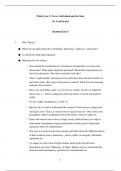Public Law 2: Power, Individual and the State
Dr Tarik Kochi
DEMOCRACY
1. Why Theory?
● Where do our ideas about the constitution, democracy, rights etc. come from?
● To clarify/develop legal argument.
● Important for law reform:
▪ How should the constitution be reformed or reorganised so as to be more
democratic? What rights should be protected? Should the state promote an
idea of social justice? But what would this look like?
▪ These ‘ought/should’ questions involve particular ideas and the assertion of
particular values. But what is their precise content? What form of reasoning
underlies these claims?
▪ But to say something ought to be involves a context. Involves a judgment
about what is... That is, judgments about the nature of social and political
reality.
▪ So any ‘ought’ presupposes a ‘what is?’
▪ But how do we find or understand this content? Is the answer in legal rules
and legal cases? That is, in some form of legal formalism? Don’t these also
presuppose ought/is judgements about the nature of power, rights etc.
▪ Hence the need to turn to theory (legal, social, political theory) to help us
understand contemporary legal/social/political reality and to understand
arguments about its interpretation.
▪ One way is to look at some big concepts and think about the different aspects
of their content: power, democracy, justice, rights, sovereignty, liberalism,
capitalism etc.
▪ To engage in some form of legal critique which looks beyond mere
description, the mere ‘balancing’ of rights. Which seems to understand the
historical and contemporary operation of constitutional law.
1
, ▪ To think about how law might be shaped by differing values, ideologies or, by
competing forms of power (economic, gendered, discursive) or by differing
systems of political organisation (feudal, monarchic, republican, liberal, neo-
liberal) or by conflicting conceptions of justice.
2. Classical Democracy
● So what is ‘democracy’? How has the meaning of this term change over time and
reflect differing legal-political constitutions?
● What is the difference between classical and modern conceptions of democracy?
● How important are the ideas of Greece and Rome to legal and political thinking
today? How dominant are these ideas? How relevant?
● 5th century BCE Athens, city-state or polis.
▪ Historical emergence from what? Aristocracies; societies of small landholders;
7-6th centuries BCE expansion of Greek commerce/colonisation in
Mediterranean; indebtedness of poorer landholders, thrown into debt-bondage,
lose liberty; changing nature of Greek war shift to hoplite armies (more equal
social status compared to aristocratic hero-warriors of Homer) and navy;
development of intensive social struggle – political concessions won by
small land-holders (end of debt bondage; equal participation in decisions of
community via constitution)... political ‘revolution’ (revolving forms of
constitution – monarchy/tyranny, aristocracy/oligarchy, democracy/mob-rule)
▪ Emergence of ‘democracy’ (demos=people)
▪ Compared: to oligarchy in Sparta; nomads (barbarians) of the north; Great
temple/palace societies of Egypt/Persia...Trading city-states of Crete and
Carthage (source of political influence?)
▪ Society of small land-owning peasants, as warrior-citizens, with full
participation in public life.
▪ Built on exclusion – women and foreigners excluded from citizenship
2





